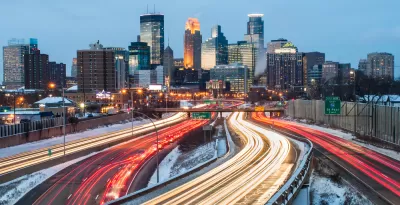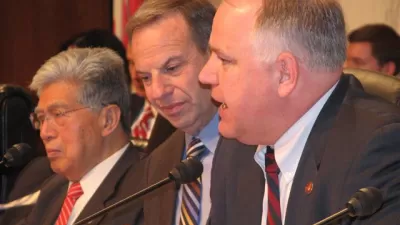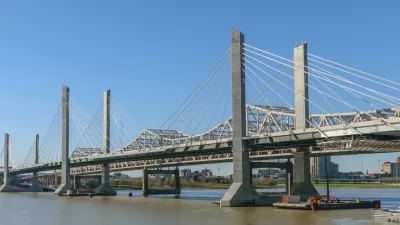Democratic Gov. Tim Walz, who took office on Jan. 7, wants to hike the state's 28.6-cents gas tax, 15% lower than the national average, so cities like Duluth won't have to ask voters to pass sales tax increases to fund local road repairs.

Democratic Governor Tim Walz, who campaigned on increasing the gas tax to invest in roads, highways and bridges, "is bracing for his first battle with Republicans when it comes to his gas tax proposal," states Anthony Matt for KBJR News.
“It’s a non-starter. Especially with a $1.5 billion surplus,” said Sen. Justin Eichorn, R – Grand Rapids.
Governor Walz says he wants the [possibly 10-cent gas tax] increase, because, as he says, Minnesota has an $18 billion transportation need over the next 20 years.
The gas tax is over a nickel lower than the national average according to API. Looking at the Tax Foundation's July 2018 gas tax map, it is lower than three of its four neighboring states as well as the Canadian provinces of Manitoba and Ontario to the north.
Governor Walz says he doesn’t want to see cities do what Duluth is trying to do, which is a half-percent sales tax increase to fund road repairs...
“The situation that happened in Duluth, it’s going to happen in Mankato, then it’s going to happen in Winona. And the real sad part is, when it starts happening in smaller communities like St. James, they don’t have the tax base to do what Duluth did. And then we have a crumbling infrastructure, which drives business away, and drives opportunity away,” said Walz.
Duluth voters overwhelmingly approved a half-cent sales tax in November 2017 to fund road repairs, but it was unable to get needed authorization by the state legislature before they adjourned last May.
"According to a study done by the Humphrey School of Public Affairs [University of Minnesota] in the Twin Cities, our gas tax currently makes up about 20% of the state’s transportation revenue," states Jessie Slater of KBJR News in the same broadcast. From the study:
[Researchers] most significant finding is that a huge percentage of transportation infrastructure in Minnesota is funded by local governments [pdf] —primarily through the property taxes they collect—rather than by the state and federal governments, the gasoline tax, and other funding, says Associate Professor Zhirong (Jerry) Zhao.
"Walz says if Republicans don’t want it, provide an alternative solution," adds Matt.
“I’m open to your (Republicans) proposals. They may propose things that I disagree with, like toll roads, but I’ll listen to them,” said Walz.
Historically, it's been politically difficult to increase the gas tax in the North Star State, though not necessarily on account of the legislature.
In Part 4 (posted here) of his eight-part series on the August 1, 2007 collapse of the I-35W Mississippi River Bridge that killed 13 people, University of Minnesota Civil Engineering Professor David Levinson recounts Republican Gov. Tim Pawlenty's three vetoes of legislative gas tax increases: in 2005; May 15, 2007, and 2008. The legislature overrode the final veto, adding a five-cents-per-gallon gas tax plus debt surcharge increments amounting to 3.5 cents [pdf], the last of which occurred in 2012.
In 2013, Democratic Gov. Mark Dayton told Democratic legislators, who controlled both branches of the state legislature, that he would not support their 7.5-cents per gallon tax hike because he felt it lacked popular support. He had a change of mind two years later, but by then, Republicans took control of the House.
Related: Minnesota Gubernatorial Candidate Campaigned on Increasing the Gas Tax and Wins, November 23, 2018.
Hat tip to AASHTO Daily Transportation Update.
FULL STORY: Walz pushing for gas tax increase

Alabama: Trump Terminates Settlements for Black Communities Harmed By Raw Sewage
Trump deemed the landmark civil rights agreement “illegal DEI and environmental justice policy.”

Study: Maui’s Plan to Convert Vacation Rentals to Long-Term Housing Could Cause Nearly $1 Billion Economic Loss
The plan would reduce visitor accommodation by 25% resulting in 1,900 jobs lost.

Planetizen Federal Action Tracker
A weekly monitor of how Trump’s orders and actions are impacting planners and planning in America.

Wind Energy on the Rise Despite Federal Policy Reversal
The Trump administration is revoking federal support for renewable energy, but demand for new projects continues unabated.

Passengers Flock to Caltrain After Electrification
The new electric trains are running faster and more reliably, leading to strong ridership growth on the Bay Area rail system.

Texas Churches Rally Behind ‘Yes in God’s Back Yard’ Legislation
Religious leaders want the state to reduce zoning regulations to streamline leasing church-owned land to housing developers.
Urban Design for Planners 1: Software Tools
This six-course series explores essential urban design concepts using open source software and equips planners with the tools they need to participate fully in the urban design process.
Planning for Universal Design
Learn the tools for implementing Universal Design in planning regulations.
Caltrans
Smith Gee Studio
Institute for Housing and Urban Development Studies (IHS)
City of Grandview
Harvard GSD Executive Education
Toledo-Lucas County Plan Commissions
Salt Lake City
NYU Wagner Graduate School of Public Service




























